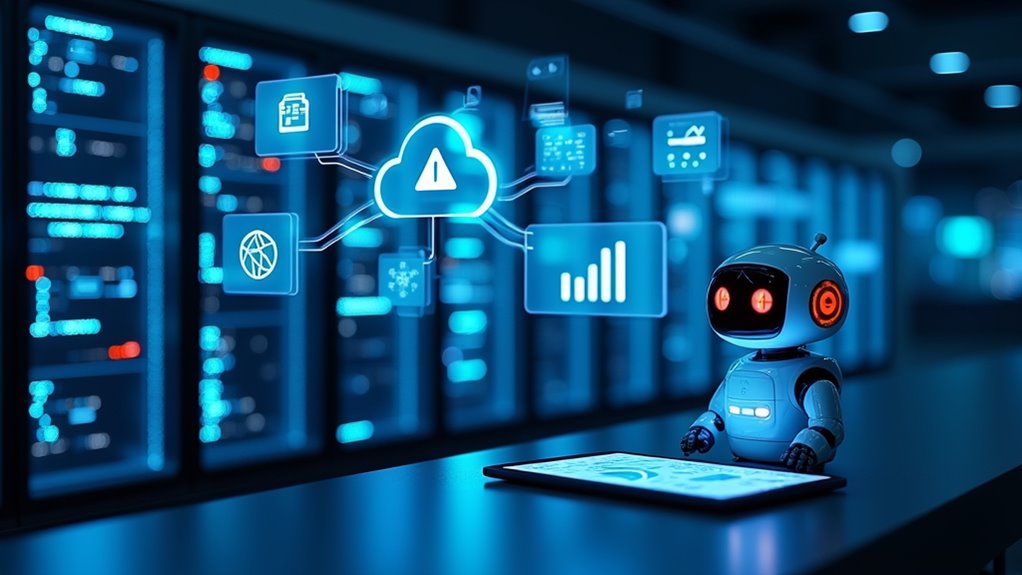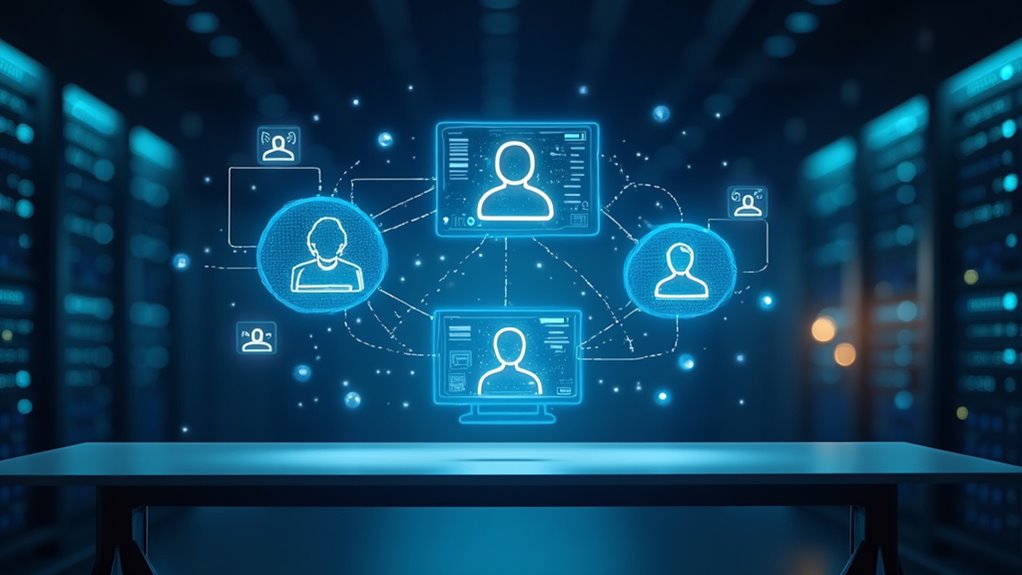Chatbot as a Service (CaaS) offers businesses 24/7 customer support through cloud-based AI systems. These smart digital assistants handle routine inquiries, freeing human agents for complex issues. CaaS slashes operational costs, scales instantly during busy periods, and even speaks multiple languages—no massive support team required. The technology uses natural language processing to understand customers’ less-than-perfect expressions, making interactions smoother across e-commerce, healthcare, and finance. Discover how these evolving digital helpers are transforming customer engagement beyond basic FAQ pages.

Countless businesses are turning to Chatbot as a Service (CaaS) solutions to revolutionize their customer interactions. These cloud-based AI systems offer round-the-clock availability, ensuring companies never miss a sales opportunity when customers come calling at 3 AM. The technology dramatically boosts customer engagement while simultaneously improving operational efficiency—two benefits that previously seemed mutually exclusive.
CaaS solutions transform customer engagement 24/7, delivering the once-impossible combination of better service and streamlined operations.
Gone are the days when businesses needed massive support teams to handle routine inquiries. Modern chatbots leverage artificial intelligence, machine learning, and natural language processing to understand what customers want—even when they express it in less-than-perfect ways. The bots get smarter with each interaction, too. They’re not just glorified FAQ pages; they’re evolving digital assistants.
These virtual helpers shine across industries. E-commerce sites use them for product recommendations, healthcare providers deploy them for appointment scheduling, and financial institutions implement them for account inquiries. The versatility is impressive, no?
What makes today’s chatbots particularly valuable is their omnichannel presence. Whether customers reach out via WhatsApp, Facebook, or a company website, the experience remains consistent. This seamless integration means businesses can meet customers wherever they are—not force them into inconvenient communication channels. The ability to handle multiple inquiries simultaneously creates a significant competitive advantage for businesses looking to scale their customer support operations.
The cost savings can be substantial. Instead of hiring additional staff during peak periods, companies can scale their chatbot operations instantly. Their ability to handle multilingual support allows businesses to serve international markets without language barriers, expanding their global reach significantly. The implementation of these AI assistants can reduce operational costs by automating repetitive tasks that would otherwise require human intervention. Human agents, meanwhile, can focus on complex issues that actually require their expertise instead of answering “What are your hours?” for the thousandth time.
Looking ahead, chatbots will only become more sophisticated as AI advances. Expect improvements in decision-making capabilities and more natural conversations that might leave you wondering if you’re chatting with a particularly efficient human.
Of course, challenges remain. Implementing these systems requires technical know-how, and data privacy concerns demand careful attention.
But for service businesses seeking improved efficiency, enhanced customer satisfaction, and reduced operational costs, chatbot services represent a compelling solution that’s becoming increasingly difficult to ignore.
Frequently Asked Questions
How Does Chatbot Pricing Scale With User Volume?
Chatbot pricing typically follows volume-based pricing models where costs increase with user interactions.
Most providers offer tiered plans that accommodate different usage levels—the more chats, the higher the price. Small businesses might pay pennies per interaction while enterprises negotiate custom rates.
Be careful though! Those seemingly affordable per-message costs add up fast when your bot gets popular.
Many services include usage thresholds in each tier before charging overage fees.
Can Chatbots Integrate With Legacy Enterprise Systems?
Yes, chatbots can integrate with legacy enterprise systems, though it’s rarely plug-and-play.
API-based legacy integration bridges the gap between outdated infrastructure and modern AI solutions.
Enterprise compatibility challenges include data format inconsistencies and security concerns, but solutions exist!
Companies can implement middleware connectors, use cloud migration strategies, or deploy digital twins to test before full implementation.
Remember, resistance to change is often a bigger hurdle than technical limitations.
Start small, demonstrate value, then expand gradually.
What Security Certifications Should Caas Providers Have?
CaaS providers should prioritize ISO 27001 and SOC 2 certifications as fundamental security compliance standards.
HIPAA is non-negotiable for healthcare data handling, while PCI DSS matters for payment processing.
FedRAMP certification opens government sector opportunities. These aren’t just fancy badges—they’re proof the provider takes data protection seriously.
Additional certifications like GDPR compliance or CSA STAR demonstrate commitment to international standards.
Don’t trust your sensitive information to providers without these basic security credentials!
How Long Does Implementation Typically Take?
Implementation timeline for chatbots varies wildly based on complexity.
Simple rule-based bots? A couple weeks.
AI-powered solutions with all the bells and whistles? We’re talking months, folks.
Project phases typically include defining requirements, building the knowledge base, integration with existing systems, and testing—lots of testing.
Your fancy enterprise-level implementation might take a month or more, while a basic chatbot could be up and running before your next performance review.
Choose wisely!
Can Chatbots Be Trained on Proprietary Company Data?
Yes, chatbots can absolutely be trained on proprietary data. Companies can feed their unique information—customer service logs, product details, internal documents—into various training methods to create highly specialized AI assistants.
This customization gives chatbots industry-specific knowledge and relevant context they wouldn’t otherwise have. The process typically involves data preparation (cleaning and categorizing), integration with NLP systems, and continuous refinement.
Smart businesses leverage this capability to create uniquely helpful tools that understand their specific terminology and needs.









